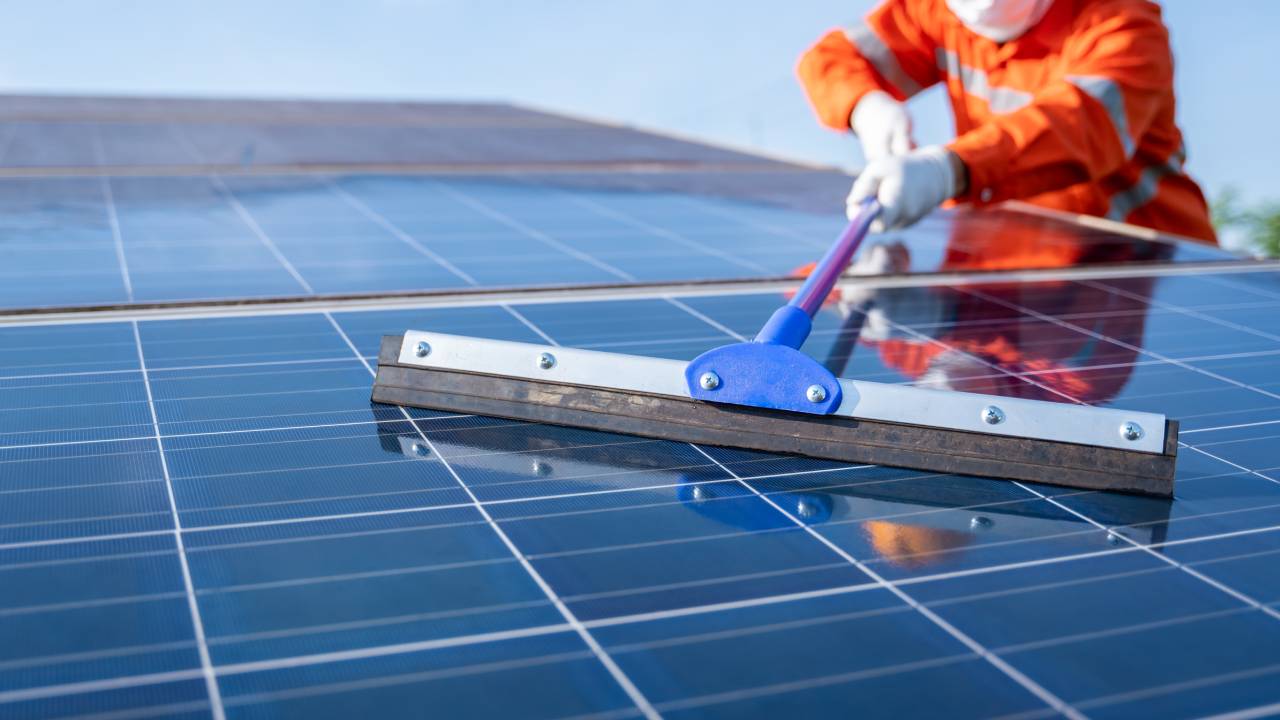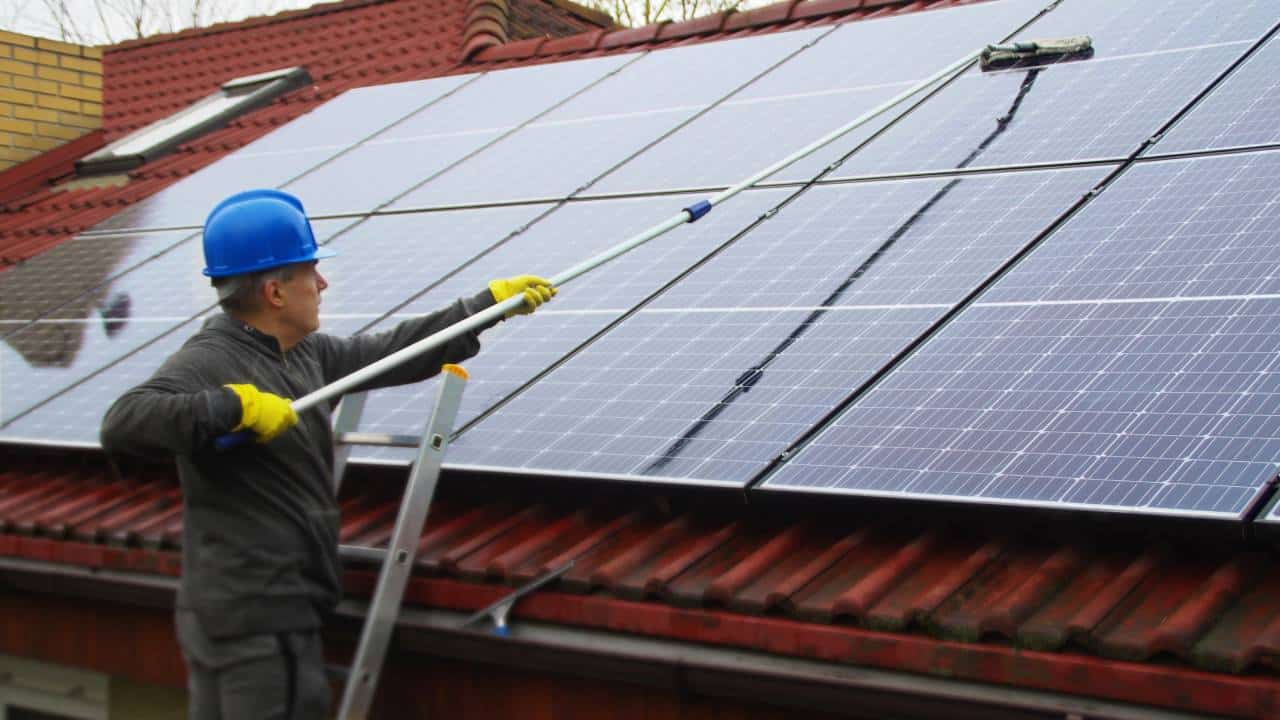Disclosure: FMB Home Picks is committed to delivering independent advice and reviews on home products and services. When you purchase through links on our site, we may earn an affiliate commission. Learn more Contact us.
Discover essential cleaning techniques, safety measures, and maintenance tips to keep your solar panels operating at their best.
Solar panels are a good investment for residential properties, offering a clean and renewable energy source while reducing your energy bills. They generate energy using the sun’s rays so proper cleaning and maintenance are crucial to ensure optimal performance and longevity.
Solar panels are exposed to various environmental elements, such as dust, dirt, pollen, bird droppings, and other debris, which can accumulate on their surface. These particles can significantly reduce the efficiency of your solar panels by obstructing sunlight and preventing the solar cells from absorbing energy. Keeping the panels clean and well-maintained can ensure peak performance, increase lifespan, and maximise the return on your investment.
This comprehensive guide will discuss cleaning and maintenance tips in detail, helping you keep your solar panels in top condition.

In order for solar panels to remain efficient, they will need to be clean of dust, debris and droppings. (Image credit: Adobe)
Regular visual inspections are the first step in maintaining your solar panels. Make it a habit to check your panels every few months or after significant weather events, such as storms or high winds. Look for any signs of dirt, debris, or damage on the panels and the mounting hardware. Early detection of any issues will help you address them promptly and prevent further complications.
For most homeowners, solar panels will be mounted on the roof where it is dangerous to undertake a manual cleaning process. In situations such as this, use a telescopic pole from a safe distance, or consider hiring a professional who will have the proper safety equipment to undertake the job.
However, some homeowners who have the space can install ground-mounted solar panels or position them on a shed or outbuilding. In order to clean these, one of the most common methods for cleaning solar panels is manual cleaning using water and a soft brush, sponge, or cloth.
Before beginning, ensure you use proper safety equipment and follow the necessary precautions: wear non-slip shoes, gloves, and eye protection.
Mix a few drops of mild dish soap in a bucket of water and gently scrub the surface of the panels to remove dirt and grime. Be sure to use non-abrasive materials, for instance a rag, not a sponge, and avoid harsh chemicals, as they can damage the panels.
Always check the terms of your warranty with your solar panel supplier or manufacturer before you begin cleaning or maintaining and follow any advice they have on the process, including techniques and products, to avoid damage.
Some solar panel installations may include automated cleaning systems, such as sprinklers or robotic cleaners. These systems can simplify the cleaning process and ensure your panels remain clean without much manual intervention. If your system does not have an automated cleaning system, it might be a good consideration to invest in one, especially if your solar panels are difficult to access or require frequent cleaning.
If you are uncomfortable with cleaning the panels yourself or have a large or complex solar panel installation, consider hiring a professional cleaning service that uses specialised equipment and techniques. They may use a deionised water system, which helps prevent mineral buildup and water spots or have access to cleaning solutions specifically designed for solar panels.
Alternatively, some window cleaners offer solar panel cleaning services. While they may not be able to identify any issues with the solar panels where a specialist could, it is an option for a routine clean after bad weather, rather than as technical maintenance.
The frequency of cleaning your solar panels depends on several factors, including local weather conditions, the angle of your panels, and the amount of dust and debris in the area. It’s advisable to clean solar panels at least once or twice a year. However, more frequent cleaning may be necessary in regions with frequent storms, heavy pollen, or bird activity.
Cleaning your solar panels in the morning or evening is ideal, as it avoids the risk of thermal stress caused by temperature differences between the cold water and the hot panels. Additionally, cleaning during cooler parts of the day is more comfortable for you and allows the panels to dry more evenly, reducing the risk of streaks.
To ensure your solar panels are functioning optimally, regularly monitor your system’s performance. Most modern solar panel systems have monitoring software that allows you to track energy production, efficiency, and other key metrics. If you notice a decline in performance, this could indicate that your panels need cleaning or maintenance.
While cleaning your solar panels, take the time to inspect the mounting hardware for signs of rust, wear, or damage. Tighten loose bolts, replace damaged components, and ensure the mounting structure is stable and secure. A well-maintained mounting system will help protect your solar panels from damage due to strong winds or other environmental factors.

For solar panel arrays at a height, opt for professional cleaning and maintenance inspections as they will have the correct safety equipment. Routine cleaning may be carried out by some window cleaners, if they offer the service and have the right tools. (Image credit: Adobe)
Regular professional maintenance and inspections can help extend the life of your solar energy system, maintain optimal efficiency, and prevent costly repairs. The frequency of professional care depends on various factors, such as your location, system size, and environmental conditions, but an annual inspection is generally recommended.
In addition to cleaning the solar panels, a professional will carry out several other important tasks.
A professional technician will thoroughly inspect your solar panels, checking for any physical damage, such as cracks, delamination, or discolouration. They should also examine the mounting structure, wiring, and connections to ensure everything is in good condition.
All of the electrical components of your solar system, including the inverter, charge controller, wiring connections and, if included in your system, batteries, will be checked and tested. The technician will also measure the system’s voltage and current to ensure it operates within the expected range and identify any potential issues.
Part of the professional service is to inspect and tighten any loose bolts or fasteners on the mounting system and ensure the panels are securely attached. The panels’ alignment and angle will also be examined, making sure they are positioned for optimal sunlight exposure.
Some solar maintenance companies offer performance monitoring services that track your system’s output and efficiency over time. By helping identify any issues early on, the technicians will ensure your solar panels operate at peak performance.
Professionals will check the inverter and charge controller for any signs of wear or malfunction and ensure the firmware is up-to-date. They will also recommend any necessary upgrades or replacements.
If your solar system includes batteries, a professional technician will inspect them for any signs of wear, corrosion, or leakage. They will also check each battery cell’s electrolyte levels, specific gravity, and voltage to ensure they are functioning properly.
Based on the inspection findings, the technician should recommend and carry out preventive maintenance measures, such as replacing worn components or addressing potential issues before they become more significant problems.